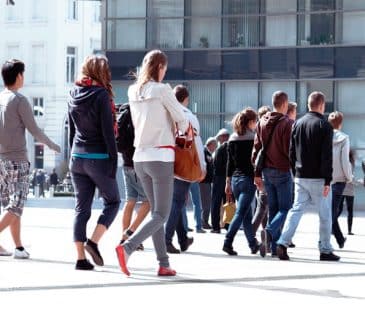How the structure of the workplace changes after the Covid-19 pandemic

The Covid- 19 pandemic and the lockdowns forced millions of employees to start working from home. This is a change that many companies have embraced as a possible long-term solution, allowing lower costs and greater employee flexibility. Following this change, unused workplaces have prompted some governments and real estate companies to consider converting office buildings into homes, shops, restaurants and even indoor farms.
However, what is certain is that employees who will return to work when the coronavirus pandemic is over may find fewer offices and more space to chat with their colleagues while drinking coffee, say real estate experts as companies try to lure remote workers to return, offering them more space for communication.
Furthermore, experts say that most of the employees are at this point bored of constantly connecting via Zoom or Skype, focusing on the fact that the main idea is to try to reduce the use of technology in the office. Social gathering places could coexist with a few high-tech rooms in a company building where employees can do computer work in a better, more ergonomic environment than they have at home. One main belief is that employers must lure people who work for them to return to the workplace, which will no longer be full of offices. The joy of working in the workplace will be much greater than it used to be if employees go to work and know that they have more available time to communicate with their colleagues, to relax near the coffee machine and to meet people.
Just imagine that you have to go to the office for a meeting. This usually happens for two or three times a week as you mainly work from home. You get into the building and you walk through almost empty offices. You say hello to a few colleagues and you go into the conference room which is prepared for the meeting. The air is fresh and everything is clean. When the meeting is over you say goodbye to your colleagues and drive back home.
The Founder and Chief Executive Officer of EDGE, Coen Van Oostrom in an article for the World Economic Forum explains that the buildings in the post pandemic era should be equipped with heat and motion sensors, automated mechanical features and cloud-based data aggregation, readily accessible via easy-to-use digital platforms. All the above, according to Oostrom consist of a more energy-efficient, humane and healthier working environment. Oostrom says that the flexible working patterns should be filled in with the appropriate technology and expertise. The Covid-19 pandemic seems to be the starting point for the conversion of the office buildings and the way that are designed and managed.
Oostrom greatly believes that the office of the future will be less crowded. It will have fewer desks and more staircases doubling as social spaces. The people who work there will commute less frequently, signing up for meetings from home. Their schedules will be instantly posted to the building network, allowing the cleaners to know exactly the time to do their work.
Not to forget to mention that a survey which was conducted in 2,000 office workers in ten countries and was published in November, found that while about one in three employees want to continue working from home after the pandemic, about the same number of employees also want to maintain access to a workplace. Undoubtedly, employees miss social connection.
However, except from the above countries and governments still promote the model of remotely working for the employees. For example, in 2020 the Government of India announced a series of measures in order to make it easier for IT and Business Process Outsourcing companies to work their employees from anywhere, permanently. This was a crucial decision for a country that has more than 4 million Information and Communication Technology workers being at the frontline of the industry. Considering that the future of the workplace will be digital, India with its powerful technology industry is leading the way. The Indian Government is open to reforms at business operations, increasing market resilience.
Have you read?
World’s Best Countries – Cultural Heritage Influence.
World’s Best Countries – Retirement.
World’s Most Forward-Thinking Countries.
World’s Best Countries For Raising Kids.
World’s Most Entrepreneurial Countries.
Add CEOWORLD magazine to your Google News feed.
Follow CEOWORLD magazine headlines on: Google News, LinkedIn, Twitter, and Facebook.
This report/news/ranking/statistics has been prepared only for general guidance on matters of interest and does not constitute professional advice. You should not act upon the information contained in this publication without obtaining specific professional advice. No representation or warranty (express or implied) is given as to the accuracy or completeness of the information contained in this publication, and, to the extent permitted by law, CEOWORLD magazine does not accept or assume any liability, responsibility or duty of care for any consequences of you or anyone else acting, or refraining to act, in reliance on the information contained in this publication or for any decision based on it.
Copyright 2024 The CEOWORLD magazine. All rights reserved. This material (and any extract from it) must not be copied, redistributed or placed on any website, without CEOWORLD magazine' prior written consent. For media queries, please contact: info@ceoworld.biz
SUBSCRIBE NEWSLETTER








